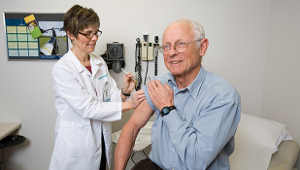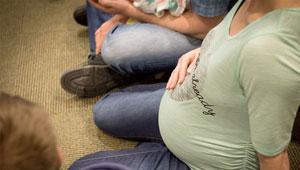- Our Research
- Research Areas
- Addictions
- Aging & Geriatrics
- Behavior Change
- Biostatistics
- Cancer
- Cardiovascular Health
- Child & Adolescent Health
- Chronic Illness Management
- Health Informatics
- Health Services & Economics
- Healthy Communities
- Medication Use & Patient Safety
- Mental Health
- Obesity
- Preventive Medicine
- Social Determinants of Health
- Vaccines & Infectious Diseases | COVID-19
- Our Scientists
- Collaborate with Us
- Our Publications
- Research Funding Sources
- Research Areas
- News and Events
- Get Involved
- About Us
- Live Healthy
All Articles on Vaccine
- GHRI answers why it's been a hard year for influenza vaccines
Dr. Michael Jackson addresses some of the top questions as to why this year's influenza vaccine is not as effective as hoped.
- Influenza: Predictably unpredictable
On December 3, 2014, the Centers for Disease Control and Prevention (CDC) released a health advisory, warning that the upcoming influenza season could be severe. KPWHRI's Dr. Mike Jackson offers his perspective on why this year's flu season may be hard to predict.
- High-dose vaccine may protect seniors better
Thanks to a new flu vaccine being distributed this flu season, seniors are getting more protection against serious seasonal flu viruses.
- Why aren’t pregnant women getting flu vaccine?
Why aren’t pregnant women getting flu vaccine?—Both mother and fetus are at increased risk for complications of flu infection during pregnancy. Prenatal care providers say they’re advising women to get the flu vaccine, but many pregnant women opt out.
- Vaccinations: A public health benefit
Most parents choose to protect their children from diseases such as measles, meningitis, polio, and whooping cough through vaccinations. But a rising number opt not to vaccinate their children fully according to the recommended schedule, and many parents have concerns about the safety or necessity of vaccines.
- Delaying measles-related vaccines may raise seizure risk
Delaying the first dose of the measles-mumps-rubella (MMR) and measles-mumps-rubella-varicella (MMRV) vaccines in children older than 15 months—outside the recommended schedule—may actually more than double the risk of fever-related seizures.
- Flu season never ends for Group Health researchers
Although this year’s flu season is pretty typical, we’re seeing more hospitalizations of people under age 65 than normal, probably because H1N1 is the predominant virus and it affects younger people more than other flu strains.
Kaiser Permanente Washington Health Research Institute for:
Kaiser Permanente Washington Health Research Institute
Phone: 206-287-2900Fax: 206-287-2871
Contact us
Sign up for our newsletter
Policy on Conflict of Interest
Nondiscrimination Notice and Language Access Services
Land Acknowledgment
Our Seattle offices sit on the occupied land of the Duwamish and by the shared waters of the Coast Salish people, who have been here thousands of years and remain. Learn about practicing land acknowledgment.





